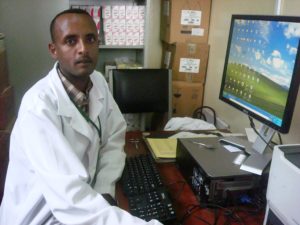
Tesfa Taye is a pharmacist and representative of the Pharmacy Case Team at Selam Health Center in Addis Ababa, Ethiopia. He is constantly reminding patients to come to the health center to collect their medicines at their scheduled appointment because he knew this would improve his patients’ adherence to treatment.
Tesfa had tried several times to keep in touch with his patients, without much success. “There was only one telephone line which was placed in the office of the medical director. We had to wait for our turn if we wanted to use it, and then we could use it only for urgent and supply-related purposes,” he recalled.
Responding to similar problems, the SIAPS Program installed telephone lines at more than 100 of the largest antiretroviral therapy (ART) pharmacies and paid a maximum of Birr 400 per month (USD 22) to settle telephone bills at each of the health facilities.
“Thanks to the support of USAID and SIAPS, we were able to establish contact with our patients at their home, workplace or at the place of their relatives or friends. We are grateful for this support as it has allowed us to trace many lost-to-follow up patients and bring them back to treatment,” Tesfa Taye said.
More than 300 patients who had defaulted on their treatment have been tracked down. Thus far, 240 have been brought back to treatment. This is 80% of patients who had defaulted or stopped taking life-saving HIV and AIDS medicines. Many of the health facilities have realized the importance of the service and are now paying the bills themselves.

